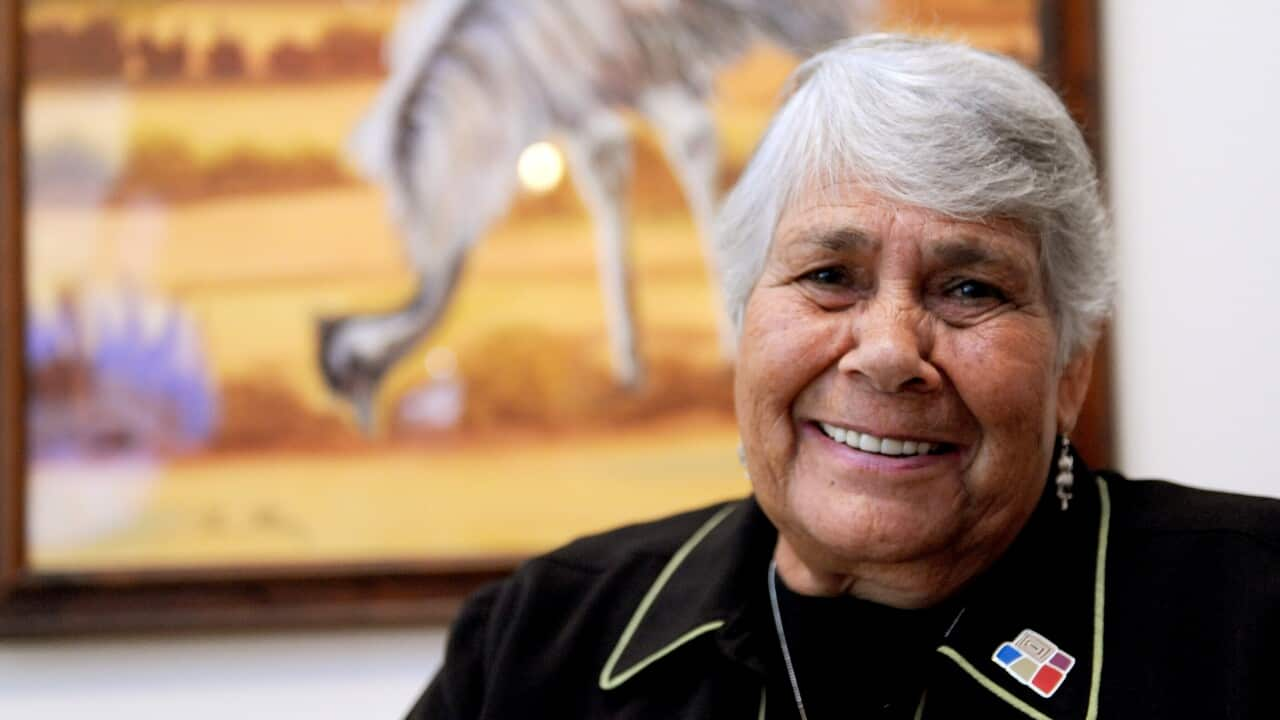Key Points
- Lowitja O'Donoghue played a pivotal role in native title legislation.
- She was the first Aboriginal person to address the United Nations.
- Prime Minister Anthony Albanese says O'Donoghue was one of the most remarkable Australian leaders.
Aboriginal rights trailblazer Dr Lowitja O'Donoghue AC CBE DSG, who helped inspire some of the greatest changes to Indigenous recognition in Australia's history, has died at home in Adelaide. She was 91.
The Yankunytjatjara woman played a key role in the 1967 referendum, lobbied the Keating government to recognise Indigenous land ownership through the native title laws and advised on the apology to the stolen generation.
Niece Deb Edwards said her aunt died peacefully on Sunday on Kauma Country in Adelaide with her immediate family by her side.
"Aunty Lowitja dedicated her entire lifetime of work to the rights, health and wellbeing of Aboriginal and Torres Strait Islander peoples," she said.
"We thank and honour her for all that she has done - for all the pathways she created, for all the doors she opened, for all the issues she tackled head on, for all the tables she sat at and for all the arguments she fought and won."
Dr O'Donoghue gained prominence after becoming the first Aboriginal person to train as a nurse at Royal Adelaide Hospital in 1954.
She had been denied the opportunity because of her Indigenous heritage and her successful lobbying was just the beginning of a career fighting for equality.
Prime Minister Anthony Albanese described Dr O'Donoghue as one of the most remarkable leaders the country has known.
"Dr O'Donoghue had an abiding faith in the possibility of a more united and reconciled Australia," he said.
"It was a faith she embodied with her own unceasing efforts to improve the lives of Aboriginal and Torres Strait Islander people, and to bring about meaningful and lasting reconciliation between Indigenous and non-Indigenous Australians."
Indigenous Australians Minister Linda Burney reflected on her experience with Dr O'Donoghue.
"Lowitja's leadership and tenacity has been an inspiration for generations of Aborginal and Torres Strait Islander Australians, including myself," she said.
"I had the great honour and privilege of working with Lowitja when I was appointed to the National Council for Aboriginal Reconciliation in 1997.
"She was a truly extraordinary leader. Lowitja was not just a giant of those of us who knew her, but a giant for our country."
Dr O'Donoghue was among the stolen generation when she was taken from her mother at two and put in a children's home.
As a young woman, she became interested in health. She advanced her nursing career by challenging discriminatory decisions.
In the 60s, she joined Aboriginal rights groups in South Australia before working as a nurse and welfare officer for the Department of Aboriginal Affairs in the same state.
She campaigned for the 1967 referendum which changed the constitution to count Aboriginal and Torres Strait Islander people in the population and make laws for them.
Dr O'Donoghue continued her advocacy and was later made a member of the Order of Australia in 1977.
READ MORE

Explainer: the Stolen Generations
She was the founding chairperson of the National Aboriginal Conference, and in 1984 was named Australian of the Year.
Dr O'Donoghue became the inaugural chairperson of the Aboriginal and Torres Strait Islander Commission in 1990.
One of her greatest achievements was lobbying the Keating government to recognise Aboriginal land ownership through the Native Title Act.
Another was her advising of then prime minister Kevin Rudd's apology to Aboriginal and Torres Strait Islander peoples, particularly the stolen generation, in 2008.
The non-profit Lowitja O'Donoghue Foundation was set up in 2022 to continue her legacy.











